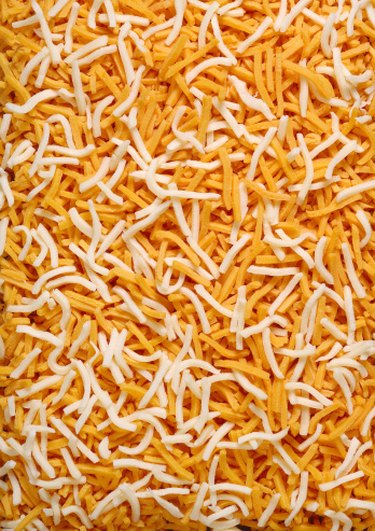
Cheese is an infinitely versatile ingredient, used in hundreds of ways to add richness and flavor to dishes. It can even motivate children to eat their vegetables. It's never been easier to add cheese to a dish now that shredded bags of it are widely available at most retailers. Oddly, shredded cheese from the store doesn't seem to clump the way home-shredded cheese does.
Shredded Cheese
Video of the Day
Most supermarkets devote a significant portion of their dairy case to shredded cheeses and cheese blends of various kinds. While purchasing shredded cheese is certainly convenient, it usually costs more than buying block cheese. This leads many home cooks to do the shredding themselves, but storage can present an issue. Shredding cheese increases its surface area exponentially, sharply increasing the risk of drying and mold. Drying can be prevented by sealing the shredded cheese in an airtight bag, but most types of cheese will meld together in a single large clump.
Video of the Day
Commercially Shredded Cheese
The shredded cheeses packaged by major manufacturers are carefully managed to provide the greatest possible shelf life. Many of them package the cheese in bags containing nitrogen or another inert gas, which prevent oxidation and inhibit mold and drying. Most brands also toss the shredded cheese with one or more inert powders, such as processed cellulose, to prevent the individual shreds from sticking to each other. Antifungal agents are also common.
Shredding Your Own
Shredding cheese at home as needed has a few obvious benefits. Cheese in a block is usually more cost-effective than the shredded variety, and the quality can also be better. Commercial shredded cheese products tend to be made from generic high-volume cheeses, while home cooks have the option of using higher quality cheeses or making a custom blend. Some also avoid the commercial product because of its additives. However, bags of home-shredded cheese will clump unless preventive measures are taken.
Storing Your Own
If home-shredded cheese is to be stored for a few days, it will need to be bagged tightly to prevent drying and reduce the risk of mold. This should be done as quickly as possible after the cheese is shredded. Place the cheese in a large mixing bowl and sprinkle it very lightly with flour, cornstarch or potato starch. Potato starch is rather coarse, so it should be pulverized to a finer texture in a mortar and pestle or food processor before it's used. Toss the cheese to coat it evenly, then bag and refrigerate.